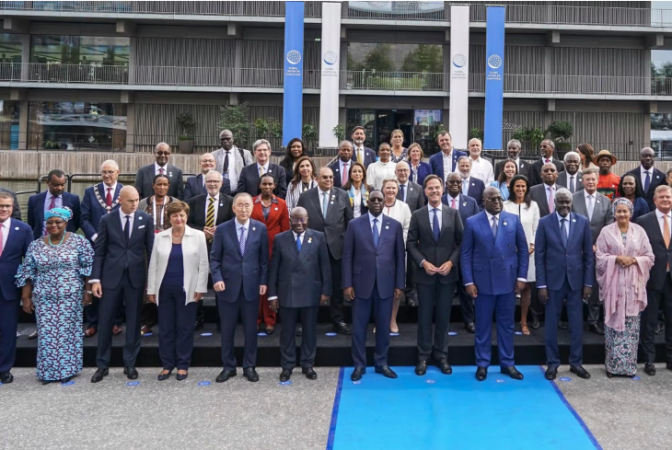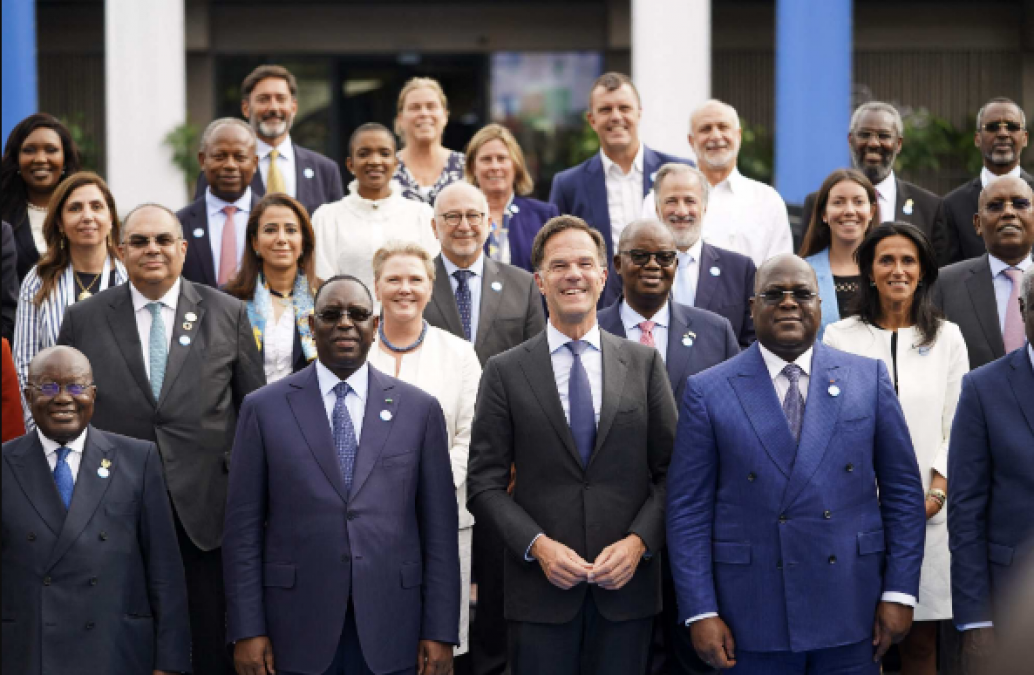
EU: African leaders have been "disappointed" by the way Western countries have approached their efforts to counter growing Chinese and Russian influence in the continent.
This was made clear last week at the African Adaptation Summit in Rotterdam when European leaders skipped a meeting to raise funds for Africa's climate adaptation projects.
The only European leader present, Dutch Prime Minister Mark Root, said: "I would have liked to have myself and my European allies here."

Senegal's President Mackie Sall, the current head of the African Union, as well as the heads of state of Ghana, Gabon, the Democratic Republic of the Congo and Ethiopia, were among the six African heads of state present.
Saul said with some bitterness, "I cannot help noticing the absence of the leaders of the industrialized world. I believe it will be easier for Europeans and others to live here.
"It leaves us with a bitter taste. I have to admit I'm a little disappointed.
In a separate incident, the European Union invited around 40 African leaders to the EU-Africa summit in Brussels in February, but only Belgian Prime Minister Alexander de Cru was reportedly present at one point from the opposing side.
The behavior of the Europeans was very bad. They could have coordinated to make sure they were adequately represented throughout the event,” said former Liberian public works minister W. Gide Moore. Can you imagine an incident in Accra where Africans over 40 hosted European leaders and then dropped them in the same room as Ghana's president?,
At the time, the European Union announced that it would raise a financing package for projects worth about US$150 billion on the continent. The amount allocated by the block for the Global Gateway Initiative, which is positioned as a rival to China's Belt and Road Initiative, is only half of that amount.
The deals were signed in Senegal as part of the EU-Africa summit, but COVID-19 and Ukrainian events have hindered progress. In line with the long history of broken promises, Moore suggests this may be standard practice.
According to observers, the EU is concerned that it is losing influence in Africa in the form of China, Russia, Turkey and other major international players. However, according to Geert Laporte, director of the European think tank group, the EU is internally divided and unable to fulfill its ambitions of becoming a strong global player.
According to Laporte, there is already a new "scramble for Africa" between major international players. According to Laport, "African interests have increased as a result of the conflict in Ukraine, and the continent has cleverly avoided taking sides to avoid being dragged into a new Cold War."
Many African leaders, he claimed, as well as their people had lost faith in Europe as a result of "protection, over-promises and under-delivery".
“To turn the tide, the EU is copying China and other major players, with massive funding commitments (Global Gateway), mostly for visible infrastructure-related projects. But it is unlikely that the EU Given the domestic conflict, Laporte would be able to deliver on his promises.
High-profile visitors from France, the United States and Russia have visited the continent recently, but observers noted that both the US and Europe were known to make empty promises.
Adams Bodomo, an African studies expert at the University of Vienna, said that "the US and the EU have never hidden the fact that they want to counter China."
Bodomo argued that the EU and EU were talking more than action, despite the fact that each of his grand plans for Africa had always been drawn up as an alternative to the Belt and Road. He continued, "China plans and builds, but America plans and builds bombs.
According to Bodomo, Russia's invasion of Africa was intended to demonstrate that it offered a competitive alternative to the Western powers there and took advantage of its positive relations with the region to influence votes in the United Nations.
South Africa's Minister of International Relations and Cooperation Naldi Pandor said that when US Secretary of State Antony Blinken visited South Africa in August, some European countries had forced countries to condemn Russia.
"And another thing I hate is being given the choice to do or not to do something. When a minister talks to me like that, I certainly won't put up with it, and I wouldn't live with any other African nation." I would rather not." I didn't expect it to be worth its salt. To consent to treatment [like that] either.
Several African countries, including South Africa, decided not to participate in voting on the UN resolution condemning the Russian invasion of Ukraine.
Chinese Foreign Minister Wang Yi stated last month that "China is making steady progress in implementing all the pledges it made in Dakar [at the Forum on China-Africa Cooperation last year], despite various difficulties and disturbances," to a group of African leaders during a virtual event.
He claimed that out of the US$10 billion in credit facilities pledged to African financial institutions, more than US$3 billion had been delivered, and nearly US$2.5 billion in loans had been allocated to Africa's priority programmes. Wang stated that more than $2 billion of the $10 billion in trade finance had already been allocated.
Russia is now posing a threat to France, which has previously sent thousands of troops to stabilise the fragile West African countries. After Bamako accused France of supporting terrorist organisations, the last French troops left Mali in August, bringing an end to a nine-year anti-terror operation. They are also being replaced by Russian mercenaries from the Wagner mercenary organisation, which has ties to the Kremlin.
According to Moore, "the pace at which their rivals and adversaries have visited the continent has increased due to the growth of both Chinese and Russian influence in the region."
In a world of multipolarity and rising geopolitics, according to Alex Vines, head of the Africa programme at the London-based think tank Chatham House, 25% of the members of the United Nations General Assembly are African.
Although the EU's attention was diverted by the Russian invasion of Ukraine, which took place a week after the EU-Africa summit, Vines noted that "increased EU funding through the Gateway Europe initiative is still planned."
According to Douglas Yates, an expert on African politics at the American Graduate School in Paris, "the simply large number of countries in sub-Saharan Africa makes it a less expensive place to 'buy' votes in international organisations."
He added that because African countries frequently have information and are quite porous, they make excellent grounds for espionage. "These countries are interested in the ideological struggles of international votes, sanctions, and the like.
EU will propose a ban on products made using forced labour